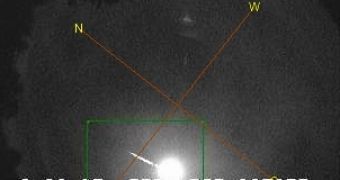A few days ago, accidental or dedicated sky watchers in Colorado were offered a nice treat, as a meteor breached in and made its way burning through the atmosphere, up to a climax point where it exploded violently, generating a light that outshone the Moon by a factor of 100. The event happened very fast, though, so it's likely there were not too many eye witnesses, as the vast majority was caught off-guard.
The 15,906th celestial event to be recorded at the site took place on December 6th 2008, at 01:06:28 MST. This fine display comes hot on the heels of a similar one taking place over the Canadian skies on November 20th. The phenomenon saw a 10-ton asteroid breaking into thousands of meteorite fragments (about 2,000 fragments per hectare), some two dozens having been found on the farmlands in the area, and with a human head-sized one weighing 13 kg.
The latest fireball resembled a lot the Saskatchewan fireball in November and the Ontario meteor a month before, and it was also more fortunate than the TC3 meteoroid impact taking place on October 7th 2008 in Sudan, which had no eye witnesses. On the recent event, Universe Today quotes astronomer Chris Peterson as saying that "In seven years of operation, this is the brightest fireball I've ever recorded. I estimate the terminal explosion at magnitude -18, more than 100 times brighter than a full Moon".
The event was captured for posterity by the camera of the Cloudbait Observatory, located about 5 km north of the town of Guffey in Colorado. Although the event was caught in the act, information from other observers is required in order to accurately pinpoint the exact altitude and location. There is a great chance that a large amount of meteorite fragments made it to the surface of the planet in the aftermath of the event, and the extra data will help the hunters locate them.

 14 DAY TRIAL //
14 DAY TRIAL //